介词及练习-初中,小学
小学介词练习题及答案
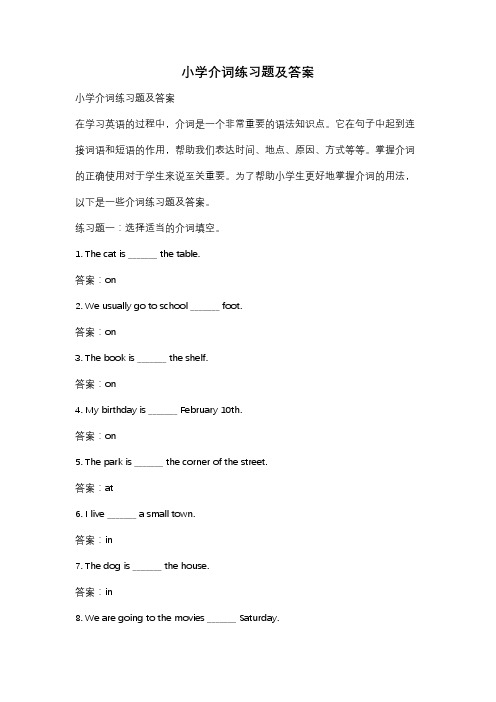
小学介词练习题及答案小学介词练习题及答案在学习英语的过程中,介词是一个非常重要的语法知识点。
它在句子中起到连接词语和短语的作用,帮助我们表达时间、地点、原因、方式等等。
掌握介词的正确使用对于学生来说至关重要。
为了帮助小学生更好地掌握介词的用法,以下是一些介词练习题及答案。
练习题一:选择适当的介词填空。
1. The cat is _______ the table.答案:on2. We usually go to school _______ foot.答案:on3. The book is _______ the shelf.答案:on4. My birthday is _______ February 10th.答案:on5. The park is _______ the corner of the street.答案:at6. I live _______ a small town.答案:in7. The dog is _______ the house.答案:in8. We are going to the movies _______ Saturday.答案:on9. The cat is hiding _______ the bed.答案:under10. The store is _______ the street from the library. 答案:across练习题二:根据句子意思选择适当的介词填空。
1. The ball is _______ the box.答案:in2. The train arrives _______ 9 o'clock.答案:at3. She is good _______ playing the piano.答案:at4. The cat jumped _______ the table.答案:off5. The party will be held _______ my house.答案:at6. The book is _______ the desk.答案:on7. We are going to the beach _______ the summer. 答案:in8. The movie starts _______ 7:30.答案:at9. The school is _______ the end of the street. 答案:at10. I am going to the store _______ my mom. 答案:with练习题三:根据图片选择适当的介词填空。
初中英语介词专项讲解及练习(包含答案)
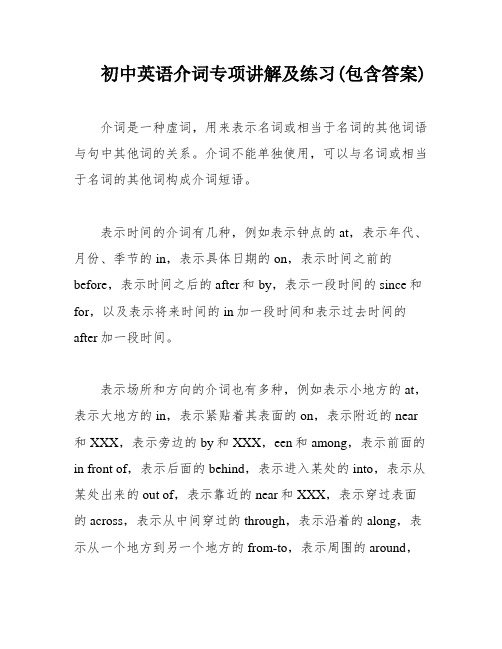
初中英语介词专项讲解及练习(包含答案)介词是一种虚词,用来表示名词或相当于名词的其他词语与句中其他词的关系。
介词不能单独使用,可以与名词或相当于名词的其他词构成介词短语。
表示时间的介词有几种,例如表示钟点的at,表示年代、月份、季节的in,表示具体日期的on,表示时间之前的before,表示时间之后的after和by,表示一段时间的since和for,以及表示将来时间的in加一段时间和表示过去时间的after加一段时间。
表示场所和方向的介词也有多种,例如表示小地方的at,表示大地方的in,表示紧贴着其表面的on,表示附近的near和XXX,表示旁边的by和XXX,een和among,表示前面的in front of,表示后面的behind,表示进入某处的into,表示从某处出来的out of,表示靠近的near和XXX,表示穿过表面的across,表示从中间穿过的through,表示沿着的along,表示从一个地方到另一个地方的from-to,表示周围的around,表示正上方的over,表示正下方的under,表示斜上方的above,表示斜下方的below。
介词的使用需要根据具体情况来判断,掌握介词的用法可以帮助我们更准确地表达自己的意思。
In using a language。
it'XXX to know about the culture and customs of the people you are XXX my experience。
as someone who has lived in different countries。
it's important to adapt and be respectful。
just like you would in your own country.With the right clothing and knowledge。
you can XXX。
初中介词用法附练习及答案

一、词类、句子成分和构词法:1、词类:英语词类分十种:名词、形容词、代词、数词、冠词、动词、副词、介词、连词、感叹词。
1、名词(n.):表示人、事物、地点或抽象概念的名称。
如:boy, morning, bag, ball, class, orange.2、代词(pron.):主要用来代替名词。
如:who, she, you, it .3、形容词(adj..):表示人或事物的性质或特征。
如:good, right, white, orange .4、数词(num.):表示数目或事物的顺序。
如:one, two, three, first, second, third, fourth.5、动词(v.):表示动作或状态。
如:am, is,are,have,see .6、副词(adv.):修饰动词、形容词或其他副词,说明时间、地点、程度等。
如:now, very,here, often, quietly, slowly.7、冠词(art..):用在名词前,帮助说明名词。
如:a, an, the.8、介词(prep.):表示它后面的名词或代词与其他句子成分的关系。
如in, on, from, above, behind.9、连词(conj.):用来连接词、短语或句子。
如and, but, before .10、感叹词(interj..)表示喜、怒、哀、乐等感情。
如:oh, well, hi, hello.2、句子成分:英语句子成分分为七种:主语、谓语、宾语、定语、状语、表语、宾语补足语。
1、主语是句子所要说的人或事物,回答是“谁”或者“什么”。
通常用名词或代词担任。
如:I’m Miss Green.(我是格林小姐)2、谓语动词说明主语的动作或状态,回答“做(什么)”。
主要由动词担任。
如:Jack cleansthe room every day. (杰克每天打扫房间)3、表语在系动词之后,说明主语的身份或特征,回答是“什么”或者“怎么样”。
【初中英语】介词练习题
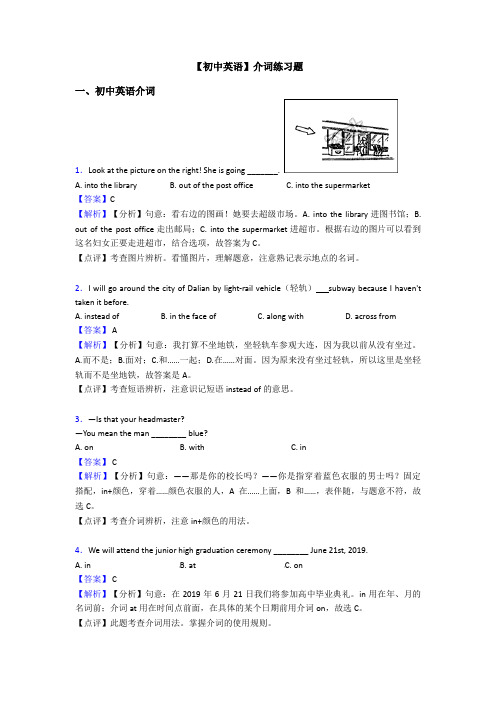
【初中英语】介词练习题一、初中英语介词1.Look at the picture on the right! She is going _______.A. into the libraryB. out of the post officeC. into the supermarket【答案】C【解析】【分析】句意:看右边的图画!她要去超级市场。
A. into the library进图书馆;B. out of the post office走出邮局;C. into the supermarket进超市。
根据右边的图片可以看到这名妇女正要走进超市,结合选项,故答案为C。
【点评】考查图片辨析。
看懂图片,理解题意,注意熟记表示地点的名词。
2.I will go around the city of Dalian by light-rail vehicle(轻轨) subway because I haven't taken it before.A. instead ofB. in the face ofC. along withD. across from【答案】 A【解析】【分析】句意:我打算不坐地铁,坐轻轨车参观大连,因为我以前从没有坐过。
A.而不是;B.面对;C.和……一起;D.在……对面。
因为原来没有坐过轻轨,所以这里是坐轻轨而不是坐地铁,故答案是A。
【点评】考查短语辨析,注意识记短语instead of的意思。
3.—Is that your headmaster?—You mean the man ________ blue?A. onB. withC. in【答案】 C【解析】【分析】句意:——那是你的校长吗?——你是指穿着蓝色衣服的男士吗?固定搭配,in+颜色,穿着……颜色衣服的人,A 在……上面,B 和……,表伴随,与题意不符,故选C。
【点评】考查介词辨析,注意in+颜色的用法。
介词易错点汇总及练习测试题
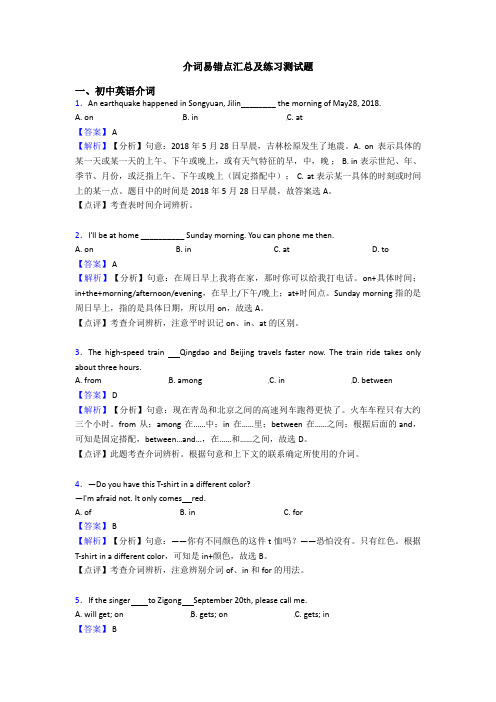
介词易错点汇总及练习测试题一、初中英语介词1.An earthquake happened in Songyuan, Jilin________ the morning of May28, 2018. A. on B. in C. at【答案】 A【解析】【分析】句意:2018年5月28日早晨,吉林松原发生了地震。
A. on 表示具体的某一天或某一天的上午、下午或晚上,或有天气特征的早,中,晚; B. in表示世纪、年、季节、月份,或泛指上午、下午或晚上(固定搭配中);C. at表示某一具体的时刻或时间上的某一点。
题目中的时间是2018年5月28日早晨,故答案选A。
【点评】考查表时间介词辨析。
2.I'll be at home __________ Sunday morning. You can phone me then.A. onB. inC. atD. to【答案】 A【解析】【分析】句意:在周日早上我将在家,那时你可以给我打电话。
on+具体时间;in+the+morning/afternoon/evening,在早上/下午/晚上;at+时间点。
Sunday morning指的是周日早上,指的是具体日期,所以用on,故选A。
【点评】考查介词辨析,注意平时识记on、in、at的区别。
3.The high-speed train Qingdao and Beijing travels faster now. The train ride takes only about three hours.A. fromB. amongC. inD. between【答案】 D【解析】【分析】句意:现在青岛和北京之间的高速列车跑得更快了。
火车车程只有大约三个小时。
from 从;among 在……中;in 在……里;between 在……之间;根据后面的and,可知是固定搭配,between…and…,在……和……之间,故选D。
初中英语介词专项练习100例(含答案)
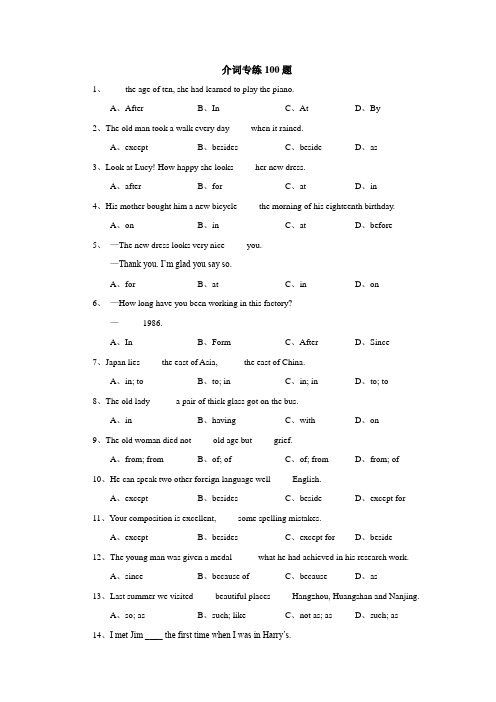
介词专练100题1、____ the age of ten, she had learned to play the piano.A、AfterB、InC、AtD、By2、The old man took a walk every day ____ when it rained.A、exceptB、besidesC、besideD、as3、Look at Lucy! How happy she looks ____ her new dress.A、afterB、forC、atD、in4、His mother bought him a new bicycle ____ the morning of his eighteenth birthday.A、onB、inC、atD、before5、—The new dress looks very nice ____ you.—Thank you. I’m glad you say so.A、forB、atC、inD、on6、—How long have you been working in this factory?—_____ 1986.A、InB、FormC、AfterD、Since7、Japan lies ____ the east of Asia, _____ the east of China.A、in; toB、to; inC、in; inD、to; to8、The old lady _____ a pair of thick glass got on the bus.A、inB、havingC、withD、on9、The old woman died not ____ old age but ____ grief.A、from; fromB、of; ofC、of; fromD、from; of10、He can speak two other foreign language well ____ English.A、exceptB、besidesC、besideD、except for11、Your composition is excellent, ____ some spelling mistakes.A、exceptB、besidesC、except forD、beside12、The young man was given a medal _____ what he had achieved in his research work.A、sinceB、because ofC、becauseD、as13、Last summer we visited ____ beautiful places ____ Hangzhou, Huangshan and Nanjing.A、so; asB、such; likeC、not as; asD、such; as14、I met Jim ____ the first time when I was in Harry’s.A、atB、inC、forD、of15、Went for a walk in the forest ____ the moonlight.A、onB、inC、forD、by16、Which subject are you good ____, English or maths?A、onB、inC、ofD、at17、Did you see a girl ____ golden hair walk into the room?A、withB、ofC、hasD、in18、____ the opinion of most people it is not good to eat too much meat.A、InB、ForC、ToD、On19、It is the best answer ____ the question.A、ofB、aboutC、forD、to20、They found nothing ___ a stone in the parcel.A、besideB、butC、besidesD、like21、The fish with sharp teeth can eat a person ____ two minutes.A、afterB、atC、forD、in22、____ the afternoon of June 18, we’ll visit the school.A、InB、AtC、OnD、By23、Some food and clothing will be supplied ____ the poor people in the mountain areas.A、forB、toC、atD、with24、He spent a large part of his salary _____ books.A、inB、onC、forD、at25、Sorry, I don’t agree ____ your plan.A、toB、onC、aboutD、with26、There will be a party ____ New Year’s Eve.A、onB、atC、forD、from27、I’ve been here ____ the year 1995.A、ever beforeB、ever sinceC、inD、during28、The Yellow River is the longest river ____ to the Changjiang River.A、nextB、thanC、toD、for29、—Grapes can be made ____ wine.—Is this bottle of wine made ____ grapes, too?—Sure. And it is made ____ China.A、into, of, forB、into, from, inC、of, from, inD、from, into, by30、_____ my visit to Europe, I finally arrived ____ Italy.A、On, inB、On, atC、During, inD、In, at31、The doctor will be free ____ .A、10 minutes laterB、after 10 minutesC、in 10 minutesD、10 minutes after32、They will try their best to compete ___ a race ____ a prize.A、for, forB、in, forC、with, inD、in, in33、It doesn’t seem useful ____ them to go on with the work.A、ofB、forC、toD、by34、It’s really nice ____ you to come and see me.A、ofB、forC、toD、from35、The door closed ____ itself.A、forB、ofC、toD、in36、It was careless ____ him to drop his watch into the river.A、toB、withC、forD、of37、Sinc e I came to China I’ve known that about seven people ____ ten speak Putonghua.A、ofB、toC、inD、about38、____ last month, Jack had been late for three times.A、ByB、SinceC、InD、For39、Let’s walk over ____ the sun ____ the other side of the street.A、in, toB、to, onC、under, toD、by, at40、They went to school by bike ____ foot today.A、butB、instead of onC、but onD、instead of41、I knew nothing about the accident ____ what I read in the paper.A、butB、instead of onC、but onD、instead of42、It is not always east to tell right ____ wrong.A、orB、betweenC、andD、from43、We walked ____ Tian An Men square to the Monument ____ the People’s Heroes.A、across, toB、across, ofC、through, forD、past, to44、The boat is passing ____ the bridge.A、underB、throughC、acrossD、towards45、They will leave a week ____ today. I do hope they can finish the work.A、fromB、onC、byD、for46、We need fifteen more people ____ our team to do the job.A、butB、exceptC、as wellD、besides47、I couldn’t sleep well ____ all the windows open.A、whenB、withC、forD、because of48、I recognized the handwriting _____.A、as our monitorB、like our monitorC、as that of our monitor’sD、like that of my monitor49、Sports and games can be ____ great help to us. Let’s all do more sports.A、ofB、withC、forD、in50、____ the two stories I’ve just read, I like the one written by the young lady better.A、InB、ByC、OfD、From51、We planned to get to London ____ Monday, but I didn’t arrive ____ Friday.A、on, onB、till, onC、to, fromD、on, until52、The accident happened ____ a cold winter morning.A、inB、onC、forD、by53、About twenty percent of the population of our country live ____ wages.A、byB、onC、withD、in54、Your voice sounds different ____ the phone.A、inB、forC、fromD、on55、The house is ____ fire; call ____ help quickly, or break the glass to sound the alarm.A、on, forB、at, forC、in, toD、on, to56、A new bridge will be built ____ the river.A、byB、inC、overD、through57、Our National Flag stands out brightly ____ the blue sky.A、againstB、byC、underD、over58、Eating too much sweets and chocolates _____ meals is bad for you.A、amongB、throughC、betweenD、for59、She looks quite young ____ her age.A、forB、ofC、inD、about60、I hope you can answer the paper ____ ink, not ____ pencil.A、at, withB、with, in aC、in, with aD、with, in61、The small village lies ____ the west of the river.A、atB、inC、fromD、to62、The children are really hungry now, so we’d better find a restaurant to eat ____.A、atB、forC、/D、with63、The manager walked ____ the room, not knowing what to do with the workers.A、back and forthB、to and fromC、up and downD、backwards and forwards64、Shall we make it a rule that no language ____ English should be spoken in an English Class.A、butB、besidesC、unlessD、like65、It is rude to make fun ____ the disabled.A、atB、aboutC、ofD、with66、_____ the bad weather, we would have gone picnicking yesterday.A、In spite ofB、But forC、Because ofD、As for67、It’s very kind ____ to help us ____ the harvest.A、of you; inB、for them; withC、of them; withD、for you; in68、They look _____ the way as the key _____ success.A、for; ofB、through; forC、on; toD、at; with69、It seems that he is always ____.A、in hurryB、in a hurryC、with a hurryD、with hurry70、Grapes are made ____ wine. That is to say, wine is made _____ grapes.A、of, intoB、into, ofC、from, fromD、into, from71、The old couple went out for a walk every morning ____ when it rained.A、besidesB、except forC、exceptD、except that72、They used to live ____ 101 Heping Road, Tianjin.A、onB、atC、toD、of73、Can you imagine how excited my grandma was the first time she talked to me ____ telephone?A、onB、byC、overD、through74、Pop singers both at home and abroad are very popular ____ young people.A、byB、toC、withD、for75、—Why were you absent ____ school yesterday?—I was ill ____ bed.A、from, inB、to, onC、at, inD、in, on76、He introduced himself ____ Big John, but his real name is John Williams.A、toB、likeC、asD、for77、As a housekeeper, ____ working, washing and sewing, she had to take care of four small Children.A、besideB、exceptC、except forD、besides78、____ everyone’s surprise, the seven-year-old boy worked out the problem ____ no difficulty.A、To, withB、In, withC、To, inD、For, in79、The old men was ____ help, he is dying.A、withoutB、besideC、beyondD、against80、We offered him our congratulations ____ his achievements.A、atB、onC、forD、of81、It was a story ____ slum life(贫民窟)in Chicago.A、inB、aboutC、fromD、of82、A steamer was going along ____ full speed, when it suddenly got into shallow water and ran aground.A、atB、onC、withD、by83、John bought an expensive walkman ____ the money his father had given him.A、withB、byC、inD、through84、I knew nothing about it ____ he told me the other day.A、exceptB、except forC、except whatD、besides that85、The teacher together with ____ is going to see the film.A、usB、weC、ourD、they86、Many new houses and tall buildings have been set up for teachers and it ____ an improvement of their conditions.A、has brought aboutB、has brought upC、has brought aroundD、has brought for87、In the march ____ the blazing (炙热)sands they experienced hunger, thirst and heat.A、throughB、pastC、crossD、across88、The bus stop is just across the street. It means ____.A、The bus stop is just on the other side of the street.B、The bus stop is just on the opposite side of the street.C、If you want to get to the bus stop, you must walk across the street.D、the bus stop is over there when you walk straight along the street.89、With her brown hair and blue eyes Jane seems to ____ her mother but in other ways she is more like her father.A、look afterB、take afterC、run afterD、be after90、Not only did they plant many trees but also they took measures ____ tree diseases.A、forB、againstC、throughD、to91、Some people became passive(not active) and stop working whenever anything ____ their wishes or wills.A、is againstB、runs againstC、goes againstD、is for92、Ah. Margaret, come ____, the fruit shop is quite near. Just ____ the corner.A、along, behindB、across, aroundC、with, acrossD、along, around93、Try to be clam and sensitive ____ of danger.A、at the momentB、of the momentC、in the momentD、on the moment94、____ o the term, our form-teacher addressed us in an excellent speech. He impressed us alot.A、At the beginningB、In the beginningC、In the endD、At the middle95、He has a good head ____.A、by businessB、in businessC、for businessD、on business96、It happened to be very cold ____ the morning of our sports meet.A、atB、ofC、onD、with97、The table belongs ____ the corner.A、toB、inC、withD、on98、Tom was gentle and he often talked with others ____ a low voice but this time he shouted suddenly ____ the top of his voice.A、in, atB、at, inC、at, withD、in, with99、The policeman angrily seize the man ____ the collar, and asked him what he meant by such bad behaviour.A、byB、inC、withD、at100、They themselves take their work for granted, and do not care what strangers may think ____ it.A、atB、aboutC、inD、with答案:1-5CADAD 6-10DACBB 11-15CBDCB 16-20 DAADB 21-25 DCBBA 26-30 ABABA 31-35 CBBAB 36-40 DCABB 41-45 CDAAA 46-50 ABACA 51-55 DBBDA 56-60 CACAC 61-65 DACAC 66-70 BCCBD 71-75 CBBCA 76-80 CDACB 81-85 BAACA 86-90 ADABB 91-95 ABCAC 96-100 C DAAB。
【英语】 介词练习题(含答案)经典1
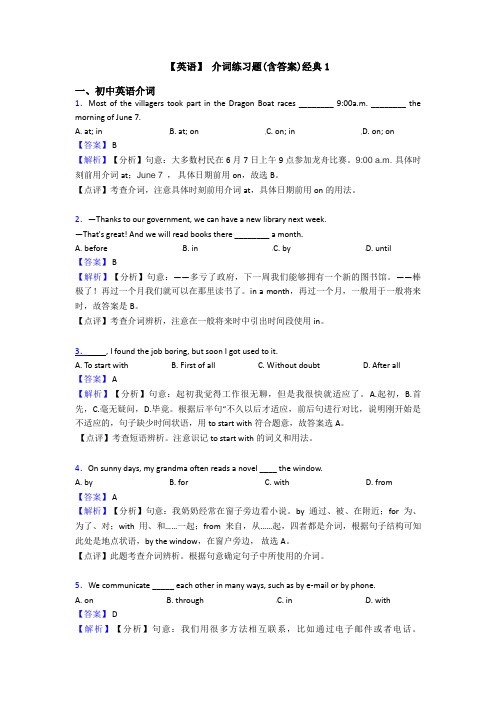
【英语】介词练习题(含答案)经典1一、初中英语介词1.Most of the villagers took part in the Dragon Boat races ________ 9:00a.m. ________ the morning of June 7.A. at; inB. at; onC. on; inD. on; on【答案】 B【解析】【分析】句意:大多数村民在6月7日上午9点参加龙舟比赛。
9:00 a.m.具体时刻前用介词at;June 7,具体日期前用on,故选B。
【点评】考查介词,注意具体时刻前用介词at,具体日期前用on的用法。
2.—Thanks to our government, we can have a new library next week.—That's great! And we will read books there ________ a month.A. beforeB. inC. byD. until【答案】 B【解析】【分析】句意:——多亏了政府,下一周我们能够拥有一个新的图书馆。
——棒极了!再过一个月我们就可以在那里读书了。
in a month,再过一个月,一般用于一般将来时,故答案是B。
【点评】考查介词辨析,注意在一般将来时中引出时间段使用in。
3. , I found the job boring, but soon I got used to it.A. To start withB. First of allC. Without doubtD. After all【答案】 A【解析】【分析】句意:起初我觉得工作很无聊,但是我很快就适应了。
A.起初,B.首先,C.毫无疑问,D.毕竟。
根据后半句“不久以后才适应,前后句进行对比,说明刚开始是不适应的,句子缺少时间状语,用to start with符合题意,故答案选A。
【点评】考查短语辨析。
小学英语常用介词用法详解及练习

小学英语常用介词用法详解及练习介词在句子中表示名词或代词等与其他词之间的关系。
不能单独作句子成分,常位于名词或代词(或与之相当的他词类、短语、从句)前面构成介词短语。
介词后面的成分作介词的宾语。
介词,是表示两词之间的关系的词。
我们在小学英语中学习的英语介词有:一、时间介词• 1.on( 1 ) 在------上面 The book is on the desk.( 2 ) 在------(哪一天/星期)What do you do on Wednesday?( 3 ) 在------(月、日)My birthday is on August 2nd.• 2.in(1)在------里面 The pens are in the pencil-box.(2)在------(哪一年/月)His birthday is in October. He wor ked here in 1992.(3)在------(地方) He works in Dongguan.•(4)在------之内 What are you going to do in 20 years?•(5)在------(早上、下午、晚上)I do morning exercises in the morning every day.I usually play basketball in the afternoon.I often do my homework in the evening.• 3.at(1)在------(点钟)I usually go to school at 8:00 am.(2)在中午 at noon二、方位介词• 1. under 在------底下 There is a ball under the bed.• 2. near 在------附近 There is a book shop near ourschool.• 3. in front of在------前面A boy is standing in front of the house.• 4. beside 在------旁边 A football is beside thedoor.• 5. next to 紧挨着 There is a bus station next to No. 13 Middle School.• 6. over 在------正上方 A bridge is over the river.•7. on the left在------左边 The bookstore is on the left.•8. on the right在------右边The hospital is on the right.•9. before在……之前 Mike sits before me.•10. after在------以后 He went home after school.•11. in the middle在------中间The road is in the middle.•12. at(1)在------(小地方) I am at school today.I was at home yesterday.(2)看一看 Look at the blackboard.•13. behind 在------后面There is a broom behind the door.。
九年级英语介词专项练习题及答案
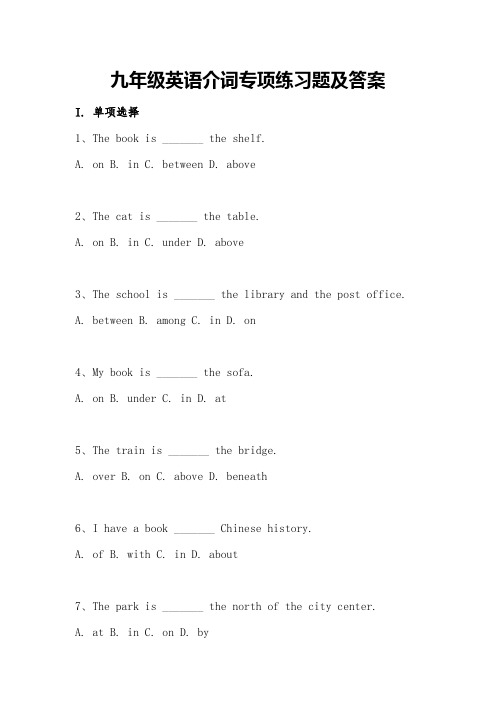
九年级英语介词专项练习题及答案I. 单项选择1、The book is _______ the shelf.A. onB. inC. betweenD. above2、The cat is _______ the table.A. onB. inC. underD. above3、The school is _______ the library and the post office.A. betweenB. amongC. inD. on4、My book is _______ the sofa.A. onB. underC. inD. at5、The train is _______ the bridge.A. overB. onC. aboveD. beneath6、I have a book _______ Chinese history.A. ofB. withC. inD. about7、The park is _______ the north of the city center.A. atB. inC. onD. by8、We often have a walk _______ the river after dinner.A. alongB. throughC. overD. above9、The plane flew _______ the clouds.A. aboveB. overC. onD. through10、They live _______ the eleventh floor of the building.A. onB. atC. inD. by11、The library is open _______ weekdays.A. fromB. onC. atD. during12、We usually have a rest _______ the afternoon.A. inB. onC. atD. during13、The meeting will start _______ a quarter past three.A. atB. inC. onD. for14、My friend is coming _______ a visit next week.A. onB. atC. forD. during15、I was born _______ a cold winter night.A. atB. inC. onD. during16、Please bring me some _______ books.A. mathsB. EnglishC. ChineseD. history17、He will arrive _______ Beijing _______ the morning _______ August 1st.A. at; in; ofB. in; in; ofC. at; on; ofD. in; on; of18、I usually have a bottle of orange _______ breakfast.A. inB. afterC. atD. before19、What are you going to do this afternoon?I am going to the cinema with my friend _______ 7:30 _______ the evening.A. at; inB. at; onC. in; onD. for; at20、Do you know what time the plane takes off?It takes off _______ 9:10 _______ the morning _______ June 1st.A. at; in; ofB. at; on; inC. on; at; ofD. on; in; of21、What are you going to do _______ the weekend?I am going to _______ a party with my family.A. at; haveB. during; haveC. at; to haveD. during; to have22、When will you start your holiday?I am going to start _______ the first day of May _______ the spring.A. at; inB. at; onC. on; inD. in; on23、Where will you stay _______ the holiday?I am going to stay _______ my uncle's home.A. at; atB. during; atC. for; inD. on; in24、What are you going to do _______ the coming winter holiday?I am going to Hainan _______ my winter holiday this year. A. at; for B. during; in C. on; at D. during; for25、When will they arrive _______ Beijing?They will arrive _______ Beijing _______ next week.A. in; at; onB. at; in; onC. in; on; atD. on; in;at26、The book _______ the shelf fell down.A. above whichB. in whichC. from whichD. on which27、He has a good knowledge of English _______ which he can understand fast-paced English movies.A. becauseB. so thatC. because ofD. as a result of28、The school is only a five-minute walk _______ my home.A. awayB. fromC. toD. at29、I have a lot of _______ to do this weekend, so I won't have time to go out with you.A. homeworkB. houseworkC. newspaperD. workbook30、He was born _______ a cold winter morning.A. inB. onC. atD. by31、They often _______ TV after dinner in the evening.A. watchB. watchedC. are watchingD. will watch32、The train _______ platform 2 will leave at 10:30 a.m..A. onB. atC. byD. in33、 Can you help me _______ my math, please?Sure, let me see what the problem is.A. withB. forC. byD. about34、 What are you going to do this weekend?I am going to _______ my grandparents on Saturday morning and then _______ my homework in the afternoon.A. visit; doB. see; doC. watch; doD. look for; make35、How many English words have you learned _______ the end of last term?About 1,500 words _______ which I can understand most of the English articles now.A. by; inB. at; inC. by; onD. at; onII. 介词填空36、The book _______ the shelf fell to the ground.37、The plane _______ which they flew to New York is very famous.38、The train _______ which we traveled was late.39、The pen _______ which he wrote was given by his teacher.40、The school _______ I studied is very famous.41、The car _______ which they carried the furniture was large.42、We'll never forget the day _______ we spent in the country.43、He often comes home late _______ which time all the shopsare closed.44、I have a friend _______ the same name as mine.45、The man _______ the top of the mountain was very excited.46、The plane ______ the airport at 8:30 in the morning.47、How do you like the film? ---I haven't seen it yet, but it ______ highly of by the audience.48、What ______ the number of the students in your class? There are 45.49、What ______ you ______ when the UFO arrived? ---I was playing in the garden.50、My grandma always forgets things -- she can't even find her way ______ her own room.51、Do you know the speed of light? ---Yes, it ______ about 300,000 kilometers per second.52、What ______ do you want to be? ---I want to be a doctor.53、What ______ do you usually have for breakfast? ---I usually have bread and milk.54、What ______ are you going to have this summer vacation? ---I am going to Hainan with my family.55、My mother often does some cleaning on ______ weekend.答案及解析1、【答案】D【解析】表示在某个物体的上方时,通常使用介词above。
【英语】 介词练习题(含答案)(word)1
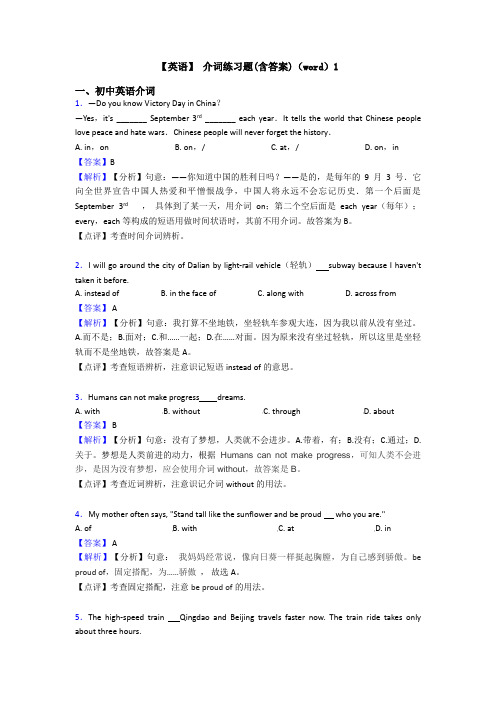
【英语】介词练习题(含答案)(word)1一、初中英语介词1.—Do you know Victory Day in China?—Yes,it's _______ September 3rd_______ each year.It tells the world that Chinese people love peace and hate wars.Chinese people will never forget the history.A. in,onB. on,/C. at,/D. on,in【答案】B【解析】【分析】句意:——你知道中国的胜利日吗?——是的,是每年的9月3号.它向全世界宣告中国人热爱和平憎恨战争,中国人将永远不会忘记历史.第一个后面是September 3rd ,具体到了某一天,用介词on;第二个空后面是each year(每年);every,each等构成的短语用做时间状语时,其前不用介词。
故答案为B。
【点评】考查时间介词辨析。
2.I will go around the city of Dalian by light-rail vehicle(轻轨) subway because I haven't taken it before.A. instead ofB. in the face ofC. along withD. across from【答案】 A【解析】【分析】句意:我打算不坐地铁,坐轻轨车参观大连,因为我以前从没有坐过。
A.而不是;B.面对;C.和……一起;D.在……对面。
因为原来没有坐过轻轨,所以这里是坐轻轨而不是坐地铁,故答案是A。
【点评】考查短语辨析,注意识记短语instead of的意思。
3.Humans can not make progress dreams.A. withB. withoutC. throughD. about【答案】 B【解析】【分析】句意:没有了梦想,人类就不会进步。
介词选择题练习
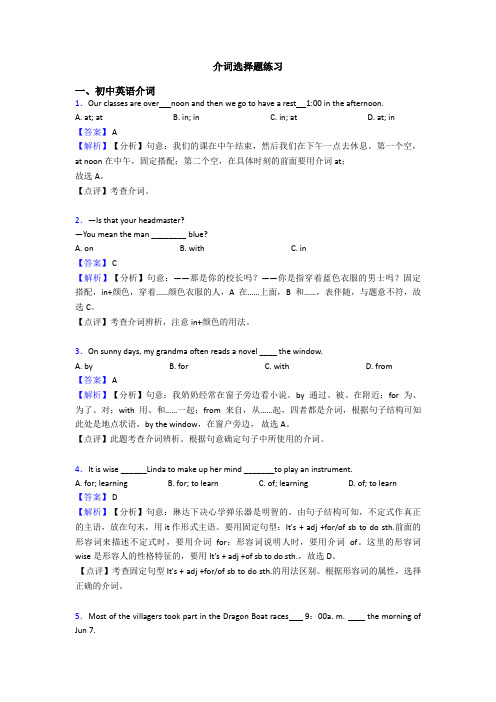
介词选择题练习一、初中英语介词1.Our classes are over noon and then we go to have a rest 1:00 in the afternoon. A. at; at B. in; in C. in; at D. at; in【答案】 A【解析】【分析】句意:我们的课在中午结束,然后我们在下午一点去休息。
第一个空,at noon在中午,固定搭配;第二个空,在具体时刻的前面要用介词at;故选A。
【点评】考查介词。
2.—Is that your headmaster?—You mean the man ________ blue?A. onB. withC. in【答案】 C【解析】【分析】句意:——那是你的校长吗?——你是指穿着蓝色衣服的男士吗?固定搭配,in+颜色,穿着……颜色衣服的人,A 在……上面,B 和……,表伴随,与题意不符,故选C。
【点评】考查介词辨析,注意in+颜色的用法。
3.On sunny days, my grandma often reads a novel ____ the window.A. byB. forC. withD. from【答案】 A【解析】【分析】句意:我奶奶经常在窗子旁边看小说。
by通过、被、在附近;for为、为了、对;with用、和……一起;from 来自,从……起,四者都是介词,根据句子结构可知此处是地点状语,by the window,在窗户旁边,故选A。
【点评】此题考查介词辨析。
根据句意确定句子中所使用的介词。
4.It is wise ______Linda to make up her mind _______to play an instrument.A. for; learningB. for; to learnC. of; learningD. of; to learn【答案】 D【解析】【分析】句意:琳达下决心学弹乐器是明智的。
介词练习题(含答案)

介词练习题(含答案)一、初中英语介词1.In China, we are using the FAST to find stars . Now more and more people want to know about the largest radio telescope(望远镜) in the world.A. in personB. in publicC. in space【答案】C【解析】【分析】句意:在中国,我们正在使用FAST 射电望远镜去找太空中的星星。
现在越来越多的人想要了解这台世界上最大的射电望远镜。
A. in person亲自,B. in public在公共场合,C.in space 在太空,根据题意和常识星星是在太空中,故答案为C。
【点评】考查介词短语。
理解句意并掌握介词短语的意思。
2.My brother joined the army ________ September last year.A. onB. byC. atD. in【答案】 D【解析】【分析】句意:我哥哥去年九月参军。
on后接具体的日期、星期和节日;by后接方式;at后接时间点、时刻;in后接某年某月;September,9月,因此前面用in,故选D。
【点评】此题考查介词。
注意表示年月动名词前用介词in。
3.—Is there ________ in today's morning news on CCTV-1?—Yes, France Team beat Korea Team by 4: 0 in the 8`h FIFA Women's World Cup in France ________ June 8, 2019.A. anything special; onB. something special; inC. special something; onD. anything special; in【答案】 A【解析】【分析】句意:——在央视一今日新闻里有特殊的事情吗?——是的。
(完整版)初中英语介词专项练习
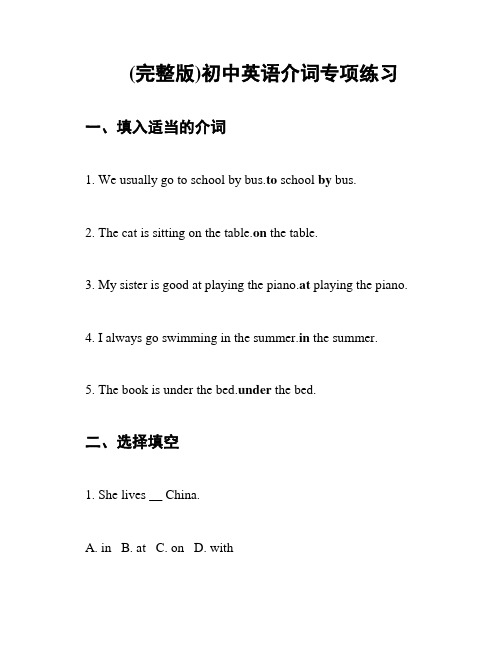
(完整版)初中英语介词专项练习一、填入适当的介词1. We usually go to school by bus.to school by bus.2. The cat is sitting on the table.on the table.3. My sister is good at playing the piano.at playing the piano.4. I always go swimming in the summer.in the summer.5. The book is under the bed.under the bed.二、选择填空1. She lives __ China.A. inB. atC. onD. with2. We arrived __ the airport late.A. onB. atC. toD. inA. onB. atC. inD. toA. onB. atC. inD. with5. Tim got a present __ his parents.A. inB. onC. fromD. with三、使用正确的介词完成句子1. I'm going __ the park __ my friends this afternoon.2. The movie starts __ 8 o'clock, so we need to be there __ time.3. Don't forget to turn __ the lights __ you leave the room.4. She's studying __ the library because it's quiet __.5. There is a beautiful garden __ the back __ our house.四、将下列句子翻译成英语1. 我住在一座小镇上。
初中英语语法介词用法讲解和练习
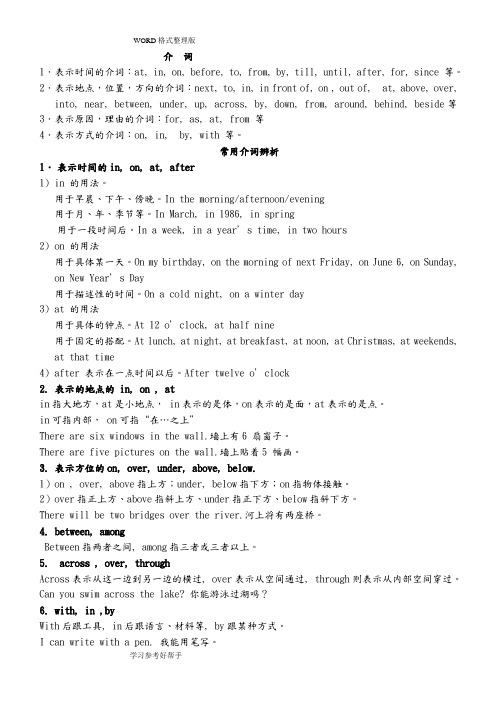
介词1.表示时间的介词:at, in, on, before, to, from, by, till, until, after, for, since 等。
2.表示地点,位置,方向的介词:next, to, in, in front of, on , out of, at, above, over, into, near, between, under, up, across, by, down, from, around, behind, beside等3.表示原因,理由的介词:for, as, at, from 等4.表示方式的介词:on, in, by, with 等。
常用介词辨析1.表示时间的in, on, at, after1)in 的用法。
用于早晨、下午、傍晚。
In the morning/afternoon/evening用于月、年、季节等。
In March, in 1986, in spring用于一段时间后。
In a week, in a year’s time, in two hours2)on 的用法用于具体某一天。
On my birthday, on the morning of next Friday, on June 6, on Sunday, on New Year’s Day用于描述性的时间。
On a cold night, on a winter day3)at 的用法用于具体的钟点。
At 12 o’clock, at half nine用于固定的搭配。
At lunch, at night, at breakfast, at noon, at Christmas, at weekends, at that time4)after 表示在一点时间以后。
After twelve o’clock2. 表示的地点的 in, on , atin指大地方,at是小地点, in表示的是体,on表示的是面,at表示的是点。
初中英语语法基础——介词专题讲解 (附同步练习试题)
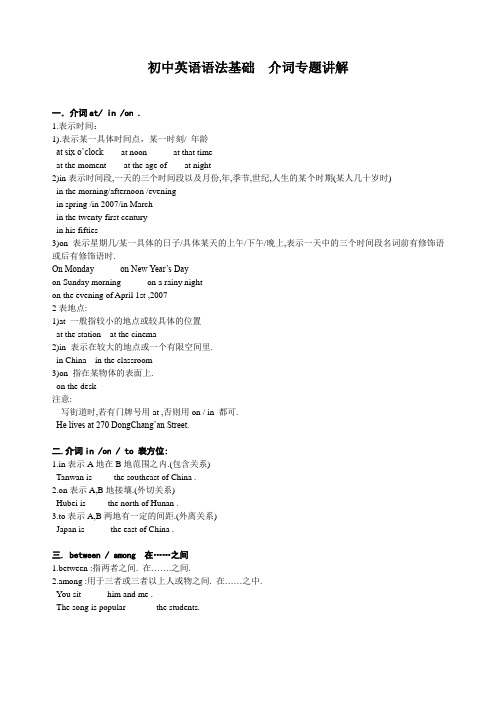
初中英语语法基础介词专题讲解一.介词at/ in /on .1.表示时间:1).表示某一具体时间点,某一时刻/ 年龄at six o’clock at noon at that timeat the moment at the age of at night2)in表示时间段,一天的三个时间段以及月份,年,季节,世纪,人生的某个时期(某人几十岁时)in the morning/afternoon /eveningin spring /in 2007/in Marchin the twenty-first centuryin his fifties3)on表示星期几/某一具体的日子/具体某天的上午/下午/晚上,表示一天中的三个时间段名词前有修饰语或后有修饰语时.On Monday on New Year’s Dayon Sunday morning on a rainy nighton the evening of April 1st ,20072表地点:1)at 一般指较小的地点或较具体的位置at the station at the cinema2)in 表示在较大的地点或一个有限空间里.in China in the classroom3)on 指在某物体的表面上.on the desk注意:写街道时,若有门牌号用at ,否则用on / in 都可.He lives at 270 DongChang’an Street.二.介词in /on / to 表方位:1.in表示A地在B地范围之内.(包含关系)Tanwan is ____ the southeast of China .2.on表示A,B地接壤.(外切关系)Hubei is ____ the north of Hunan .3.to表示A,B两地有一定的间距.(外离关系)Japan is _____ the east of China .三. between / among 在……之间1.between :指两者之间. 在…….之间.2.among :用于三者或三者以上人或物之间. 在……之中.You sit _____ him and me .The song is popular ______ the students.四.after / in 在……之后 before / in 在……之前1. after1)after + 时间段. 表示以过去某一时刻为起点的一段时间之后, 用于过去时.2)after 作介词. after doing sth.2.in +一段时间. 表示说话时或以现在为起点的将来一段时间之后.用于将来时.He came back ______ two days .He will go home___finishing his homework .He will come back _____ two days .3. before 多用于时间点或一件事之前发生,即“先于……;在……之前”He left the office bofore I got there. I’ll be back before five o’clock.4. ago 时间段+ ago 表示“多久之前”时态通常用:一般过去时I met Tom two days ago.五.with / in / by 表示“用……”1.with 表示“用…” 一般指有形的工具/ 手段/ 人体器官.He cut the apple into halves ____ a knife .注: with 表伴随, “带有,含有”He came in _____ a big smile on his face .2.in表示用某种语言,方式,途径. 或书写/绘画所用的材料. 也可表交通方式.Can you say it _____English ?He wrote a letter ____ blue ink .3.by表示乘坐交通工具, 表示方式,方法I study for a test _____ working with a group .He makes a living ____ selling newspapers .注意: 同义词组1).by phone = on the phone2).by car = in a car3).in pen = with a pen = with pens六.across / through / over / by 经过1.across 指横穿,穿过. 表示动作从某一物体表面上经过.2.through 指穿过,透过,表示从某一物体空间内通过.3.over 表示从某人或某物的上空经过或越过,不与表面接触.4.by 表示从某人/某物的旁边经过.Can you swim ______ the river ?the elephant is so big that it can’t go _____ the gate .I don’t think anyone can jump ___ the fenc e.I walked _____ the bank of China yesterday .七.in front of / in the front of1.in the front of 表示在…….内部的前面2.in front of 表示在……外面的前面There is a desk in _____ front of our classroom .There is a big tree in _____ front of our classroom.八.其它介词的用法:1.at的其它用法.1).表示“从事或正在做某事”,其后加的名词往往不加冠词.She is at work now = She is working now .2)at表示“价格或速度”The train ran at 120 kilometers an hour .2.in的其它用法:1)in表示“在……方面”词组:do well in = be good atbe weak in2)in 表示“穿着”后接表颜色的词或衣服.词组: be in +衣服= be wearing +衣服3)in作副词, “在家” = at home3.like 的用法:1).像/和……一样. 常与系动词连用.词组: look like sound like2).与what 连用, “是什么样子, 怎样”.What is he like ? He is kind .4.off的用法:1).从……下来, 脱离某物体.词组: fall off2). “休假”通常放在时间名词之后.词组: have +时间+ offHe has n’t had a night off for two hours .5.except / besides1).except 除了…….之外, 都……. . 不包括在范围之内.注: nothing but … 除了……之外,什么也没有.2).besides除了……之外,还有…… . 包括在范围之内.We all went swimming ______ Lucy .There is _______ a letter in the box .We study Japanese and French____ English .6.with / without1).with具有,含有反义词: without 没有词组: with the help of = with one’s help =because of = thanks towithout one’s help2).without 的用法:A).without + sb./ sth. 没有某人或某物B).without + doing sth . He lef t here without____(say ) “Goodbye”to usC). without sth 常与if 引导的否定的条件句.If there is no water , we can’t live .= We can’t live ______ _______ .7.on the tree /in the treeon the tree 表示“树上本身长的东西” 在树上.in the tree 表示“外界的物体进入树中” 人或物在树上.There are some apples _____ the tree .There is a boy ____ the tree.8.表示“数量的介词”about , round around , over1). about , round around表示“大约……”2).over 表示“超过”= more than.9.inside / outsideInside 在……里面------反义词:outside在….外面10.in the wall /on the wallin the wall 表示“门窗在墙上” on the wall 表示“某东西张贴或挂在墙上”九.不用介词的情况:1).当时间状语为: tonight, today, yesterday, tomorrow 等时,不用介词. What are you going to do tonight ?2).含有this, that, these, those, last, next, every/each day等时间状语.He went to Wuhan last week . I drink milk every day.3).以all 开头的时间状语前面不用介词.He has worked all day .4).以some ,any, one 等构成的时间状语前不用介词.He met a bad man one cold morning. = He met a bad man on a cold morning.介词专题小测:一、单项选择题。
初中英语介词专项练习(附答案)含答案解析
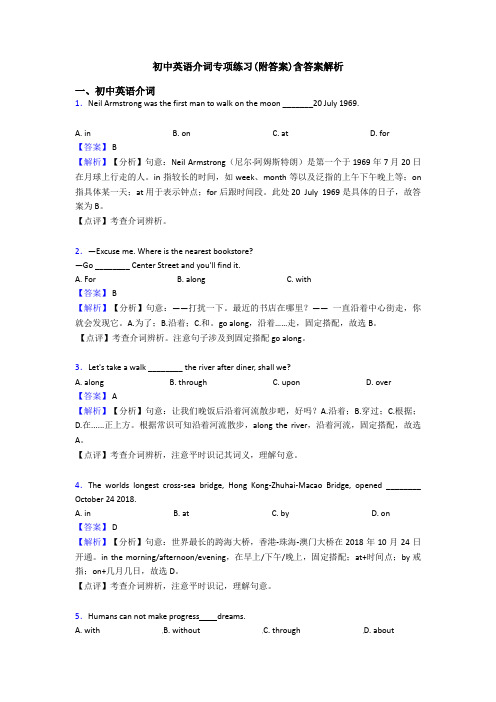
A. at B. by C. over D. under
【答案】D
【解析】【分析】句意:弗兰克在水下屏住呼吸,在游泳池中找他的戒指。A.在……,B.通过某种方式;C.高于;D.在……下,面。根据Frank held his breath和in the swimming,可知一定是在水下,应使用介词under,故答案是D。
【点评】考查近词辨析,注意识记介词without的用法。
6.My mother often says, "Stand tall like the sunflower and be proudwho you are."
A. of B. with C. at D. in
【答案】A
【解析】【分析】句意:我妈妈经常说,像向日葵一样挺起胸膛,为自己感到骄傲。be proud of,固定搭配,为……骄傲,故选A。
【点评】考查介词辨析,注意结合语境思考问题并解决问题。
9.In the world, more than 30% of schools do not provide safe drinking water _________about 570 million children.
A. with B. for C. towards
【点评】考查介词辨析。
2.—Excuse me. Where is the nearest bookstore?
—Go ________ Center Street and you'll find it.
英语介词练习题含答案
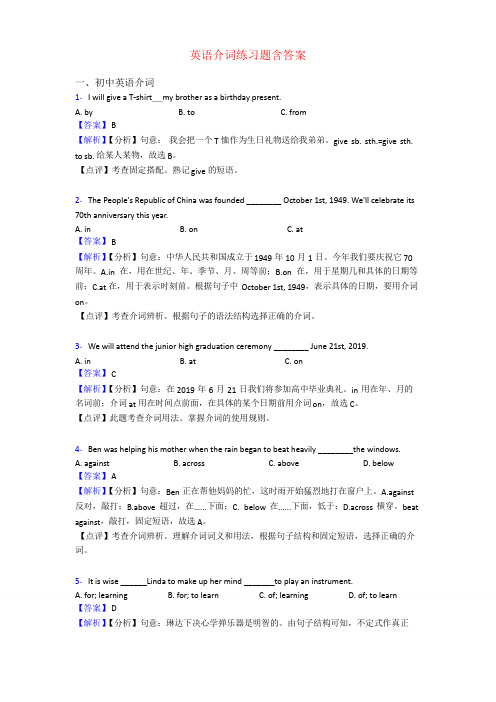
英语介词练习题含答案一、初中英语介词1.I will give a T-shirt my brother as a birthday present.A.byB.toC.from【答案】B【解析】【分析】句意:我会把一个T恤作为生日礼物送给我弟弟。
give sb.sth.=give sth. to sb.给某人某物,故选B。
【点评】考查固定搭配。
熟记give的短语。
2.The People's Republic of China was founded________October1st,1949.We'll celebrate its 70th anniversary this year.A.inB.onC.at【答案】B【解析】【分析】句意:中华人民共和国成立于1949年10月1日。
今年我们要庆祝它70周年。
A.in在,用在世纪、年、季节、月、周等前;B.on在,用于星期几和具体的日期等前;C.at在,用于表示时刻前。
根据句子中October1st,1949,表示具体的日期,要用介词on。
【点评】考查介词辨析。
根据句子的语法结构选择正确的介词。
3.We will attend the junior high graduation ceremony________June21st,2019.A.inB.atC.on【答案】C【解析】【分析】句意:在2019年6月21日我们将参加高中毕业典礼。
in用在年、月的名词前;介词at用在时间点前面,在具体的某个日期前用介词on,故选C。
【点评】此题考查介词用法。
掌握介词的使用规则。
4.Ben was helping his mother when the rain began to beat heavily________the windows. A.against B.across C.above D.below【答案】A【解析】【分析】句意:Ben正在帮他妈妈的忙,这时雨开始猛烈地打在窗户上。
【英语】 介词知识点总结复习及练习测试题

【英语】介词知识点总结复习及练习测试题一、初中英语介词1.—Could you give me some advice on learning English well?—Sure. But remember nothing can be learned hard work.A. byB. withoutC. through【答案】 B【解析】【分析】句意:——你能给我一些关于学好英语的建议吗?——当然。
但是记住,没有努力,什么都学不到。
A. by通过;B. without没有;C. through通过。
根据句子前面的nothing和后面的hard work,可知双否表示肯定,应用介词without,表“没有努力,什么都学不到”。
故选B。
【点评】考查介词辨析。
注意掌握介词短语without+名词的意思及用法。
2.We will attend the junior high graduation ceremony ________ June 21st, 2019.A. inB. atC. on【答案】 C【解析】【分析】句意:在2019年6月21日我们将参加高中毕业典礼。
in用在年、月的名词前;介词at用在时间点前面,在具体的某个日期前用介词on,故选C。
【点评】此题考查介词用法。
掌握介词的使用规则。
3.We are going to have a party ______ the evening of June 30th.A. onB. inC. atD. for【答案】 A【解析】【分析】句意:我们打算在六月三十日晚上举行晚会。
根据30th,可知是具体日期,on+具体日期,是固定搭配,在某天,故选A。
【点评】考查固定搭配,注意on+具体日期的用法。
4.Ben was helping his mother when the rain began to beat heavily ________the windows.A. againstB. acrossC. aboveD. below【答案】 A【解析】【分析】句意:Ben正在帮他妈妈的忙,这时雨开始猛烈地打在窗户上。
小学介词练习附答案
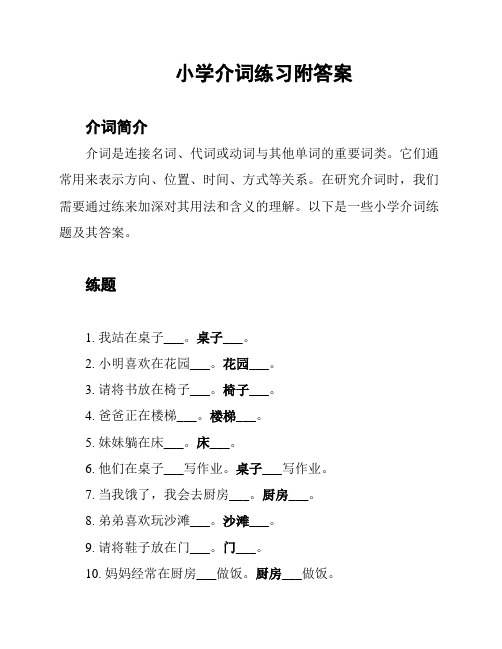
小学介词练习附答案介词简介介词是连接名词、代词或动词与其他单词的重要词类。
它们通常用来表示方向、位置、时间、方式等关系。
在研究介词时,我们需要通过练来加深对其用法和含义的理解。
以下是一些小学介词练题及其答案。
练题1. 我站在桌子___。
桌子___。
2. 小明喜欢在花园___。
花园___。
3. 请将书放在椅子___。
椅子___。
4. 爸爸正在楼梯___。
楼梯___。
5. 妹妹躺在床___。
床___。
6. 他们在桌子___写作业。
桌子___写作业。
7. 当我饿了,我会去厨房___。
厨房___。
8. 弟弟喜欢玩沙滩___。
沙滩___。
9. 请将鞋子放在门___。
门___。
10. 妈妈经常在厨房___做饭。
厨房___做饭。
答案1. 我站在桌子上。
桌子上。
2. 小明喜欢在花园里。
花园里。
3. 请将书放在椅子上。
椅子上。
4. 爸爸正在楼梯上。
楼梯上。
5. 妹妹躺在床上。
床上。
6. 他们在桌子上写作业。
桌子上写作业。
7. 当我饿了,我会去厨房里。
厨房里。
8. 弟弟喜欢玩沙滩上。
沙滩上。
9. 请将鞋子放在门上。
门上。
10. 妈妈经常在厨房里做饭。
厨房里做饭。
希望这些练习题和答案对你的学习有所帮助。
通过多做练习,你将更加熟练地运用介词,提高你的语言能力。
加油!。
【初中英语】 介词专项讲解及练习(1)

必备英语【初中英语】介词专项讲解及练习一、初中英语介词1.—Bill, did you see Tom?—Yes, he just parked his car here and then hurried the street.A. throughB. overC. pastD. across【答案】 D【解析】【分析】句意:—比尔, 你看见汤姆了吗?—是的,他刚刚把车停在这儿,然后匆忙穿过街道。
A. through穿过(从物体中间穿过);B. over越过(在物体上方,不接触);C. past经过(从旁边经过);D. across穿过(从物体表面横穿),穿过街道应该是从表面穿过,用across。
故选D。
【点评】考查介词辨析。
熟记这些介词的含义。
2.I'll be at home __________ Sunday morning. You can phone me then.A. onB. inC. atD. to【答案】 A【解析】【分析】句意:在周日早上我将在家,那时你可以给我打电话。
on+具体时间;in+the+morning/afternoon/evening,在早上/下午/晚上;at+时间点。
Sunday morning指的是周日早上,指的是具体日期,所以用on,故选A。
【点评】考查介词辨析,注意平时识记on、in、at的区别。
3.I will go around the city of Dalian by light-rail vehicle(轻轨) subway because I haven't taken it before.A. instead ofB. in the face ofC. along withD. across from【答案】 A【解析】【分析】句意:我打算不坐地铁,坐轻轨车参观大连,因为我以前从没有坐过。
A.而不是;B.面对;C.和……一起;D.在……对面。
- 1、下载文档前请自行甄别文档内容的完整性,平台不提供额外的编辑、内容补充、找答案等附加服务。
- 2、"仅部分预览"的文档,不可在线预览部分如存在完整性等问题,可反馈申请退款(可完整预览的文档不适用该条件!)。
- 3、如文档侵犯您的权益,请联系客服反馈,我们会尽快为您处理(人工客服工作时间:9:00-18:30)。
词汇
⑴ 单词
1、介词
1)、in表示“在……中”,“在……内”
例如:
in our class 在我们班上。
in my bag 在我的书包里。
in the desk 在桌子里。
in the classroom 在教室里。
2)、on 表示“在……上”
例如:
on the wall 在墙上。
on the desk 在桌子上。
on the blackboard 在黑板上。
3)、under表示“在……下”
例如:
under the tree 在树下。
under the chair 在椅子下。
under the bed 在床下。
4)、behind表示“在……后面”
例如:
behind the door 在门后。
behind the tree 在树后。
5)、near表示“在……附近”
例如:
near the teacher's desk 在讲桌附近。
near the bed 在床附近。
6)、at表示“在……处”
例如:
at school 在学校。
at home 在家。
at the door 在门口。
7)、of 表示“……的”
a picture of our classroom 我们教室的一幅画。
a map of China 一张中国地图。
2、冠词 a / an / the
冠词一般位于所限定的名词前,用来署名名词所指的人或事物。
冠词有不定冠词和定冠词两种。
不定冠词有两个形式,即a和an。
a用在以辅音音素开头的词前,如a book; an 用在以元音音素开头的字母前,如a或an与可数名词单数连用,泛指某类人或某物中的一个。
This is a cat。
这是一只猫。
It's an English book。
这是一本英语书。
His father is a worker。
他的爸爸是个工人。
the既可以用在可数名词前,也可以用在不可数名词前,表示某个或某些特定的人或事物,也可以指上文提到过的人或事物。
Who's the boy in the hat?
戴帽子的男孩是谁呀?
------ What can you see in the classroom?
------ I can see a bag。
------ Where's the bag?
------ It's on the desk。
------- 你能在教室里看到什么呀?
------ 我能看见一个书包。
------ 书包在哪呀?
------ 在桌子上。
3、some和any
①、在肯定句中用some。
例如:
There are some books on the desk.桌子上有一些书。
Lucy has some good books露西有一些好书。
②、在疑问句和否定句中用any。
例如:
Is there any ink in your pen?你的钢笔里有墨水吗?。
Do you have any brothers and sisters?你有兄弟姐妹吗?。
There isn't any water in the glass.杯子里没有水。
⑵记住它们的特殊用法。
①、some亦可用于表示盼望得到对方肯定的答复或表示建议、委婉请求的疑问句中,这一点我们不久就会学到。
例如:
Would you like to have some apples?你想吃苹果吗?。
②、any也可用于肯定句中,表示“任何的”。
例如:
Any one of us can do this.我们当中任何一个都能做这个。
some 和any的用法是经常出现的考点,希望大家能准确地掌握它们的用法。
4、family看作为一个整体时,意思是“家庭”,后面的谓语动词be用单数形式 is ;如把family看作为家庭成员时,应理解为复数,后面的谓语动词be应用are
My family is a big family. 我的家庭是个大家庭。
My family are all at home now. 我的家人现在都在家。
Family强调由家人组成的一个集体或强调这个集体中的成员。
home指个人出生、被抚养长大的环境和居住地点。
house指“家”、“房屋”,侧重居住的建筑本身。
His family are all workers. 他的家人都是工人。
My home is in Beijing. 我的家在北京。
He isn't at home now. 他现在不在家。
It's a picture of my family. 这是一张我全家的照片。
5、little的用法
a little dog 一只小狗,a little boy 一个小男孩。
little常用来修饰有生命的名词。
但little还可表示否定意义,意为“少的”,加不可数名词。
There is little time. 几乎没时间了。
There is little water in the cup. 杯中水很少。
词组on the desk 在桌子上。
behind the chair 在椅子后。
under the chair 在椅子下面。
in her pencil-box 在她的铅笔盒中。
near the door 在门附近。
a picture of a classroom 一个教室的图片。
look at the picture 看这张图片。
the teacher's desk 讲桌。
a map of China 一张中国地图。
family tree 家谱。
have a seat 坐下,就坐。
this way 这边走。
